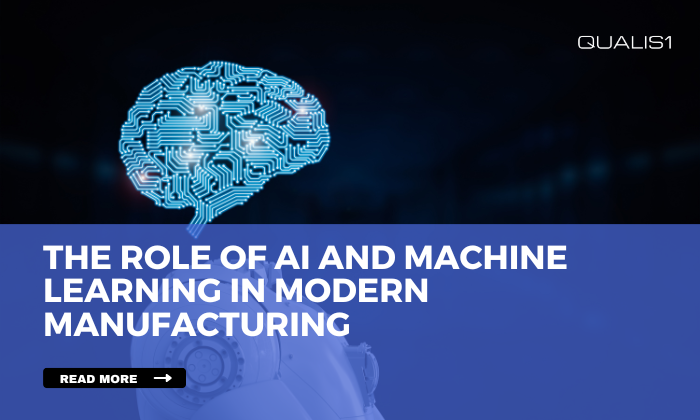Call Us
Reach Us

AI and ML have changed many industries, including manufacturing. AI and ML are revolutionizing manufacturing by enhancing product manufacturing processes and increasing operational efficiency. This technology is transforming the way products are produced and improving overall efficiency in manufacturing operations. AI and ML are making manufacturing processes more efficient than ever before. This blog discusses how AI is impacting manufacturing. It explores the advantages and disadvantages of using AI in this industry. It also looks at the future of manufacturing with AI and ML.
How AI is Transforming the Manufacturing Industry
AI and ML help manufacturers gather and analyze lots of data, making production processes smarter, faster, and more efficient. AI-driven systems can predict equipment failures before they happen, optimize supply chain logistics, and even improve product design.
1. Predictive Maintenance: AI uses data from machines to predict when maintenance is needed, reducing downtime and costs. This shift from reactive to predictive maintenance helps in avoiding unexpected equipment failures and extends the life of machinery .
2. Quality Control: AI-powered vision systems are used for quality control by inspecting products in real-time. These systems are more effective than people at identifying errors. They ensure that only high-quality products are delivered to customers.
3. Improving Supply Chains: AI predicts demand, manages inventory, and finds the best delivery routes to optimize supply chains. This leads to reduced costs, improved delivery times, and enhanced customer satisfaction .
Benefits of AI in Manufacturing Processes
Using AI in manufacturing saves money, boosts efficiency, and enhances product quality.
1. Increased Efficiency: AI systems can process and analyze data faster and more accurately than humans. This leads to more efficient production processes, reducing waste and increasing productivity .
2. Cost Reduction: By predicting maintenance needs and optimizing operations, AI can significantly reduce operational costs. Automated systems can also reduce labor costs by performing tasks that are repetitive or dangerous for humans .
3. Enhanced Product Quality: AI improves product quality through better design, precise manufacturing processes, and real-time quality control. This results in fewer defects and higher customer satisfaction .
Challenges of Implementing AI in Manufacturing
While the benefits are clear, implementing AI in manufacturing comes with its set of challenges.
1. High Initial Investment: The cost of implementing AI systems can be high. This includes the cost of hardware, software, and the necessary infrastructure. Small and medium-sized enterprises (SMEs) might find it challenging to afford these initial costs .
2. Data Management: AI systems require large amounts of data to function effectively. Managing and processing this data can be complex and require significant resources. Ensuring data quality and security is also a critical concern .
3. Skill Gap: There is a need for skilled professionals who can develop, implement, and maintain AI systems. The current workforce may require additional training and education to fill this gap, posing a challenge for manufacturers .
Future of Manufacturing with AI and Machine Learning
AI and ML will revolutionize manufacturing, bringing major changes and advancements in the future.
1. Smart Factories: Smart factories are becoming a reality as machines are connected and communicate with each other. These factories use AI to optimize production processes in real-time, making them highly efficient and adaptable .
2. Human-AI Collaboration: The future will likely see more collaboration between humans and AI. AI will handle repetitive and dangerous tasks, while humans will focus on creative and strategic activities. This synergy will lead to safer and more productive work environments .
3. Sustainable Manufacturing: AI can contribute to more sustainable manufacturing practices by optimizing resource usage and reducing waste. Predictive maintenance can extend the life of machinery, and AI-driven design can lead to more energy-efficient products .
Case Studies of AI in Manufacturing
Several companies are already reaping the benefits of AI in their manufacturing processes.
1. Siemens: Siemens uses AI to optimize its manufacturing processes and supply chain management. Their AI-driven predictive maintenance system has significantly reduced downtime and maintenance costs .
2. General Electric (GE): GE has implemented AI in its jet engine manufacturing process. AI algorithms use engine sensors to predict maintenance needs and improve performance, resulting in better efficiency and lower costs.
3. BMW: BMW uses AI for quality control and predictive maintenance. Their AI systems check vehicles for problems better than humans, ensuring good quality and lowering production costs.
Conclusion
AI and Machine Learning are changing manufacturing by making it more efficient, cheaper, and improving the quality of products. While there are challenges in implementation, the benefits far outweigh them. The future of manufacturing looks promising, with smart factories, human-AI collaboration, and sustainable practices leading the way. Companies that embrace these technologies will be better positioned to compete in the rapidly evolving manufacturing landscape.
For more insights on how AI is transforming the manufacturing industry and to explore the latest advancements, visit [Qualis.com]